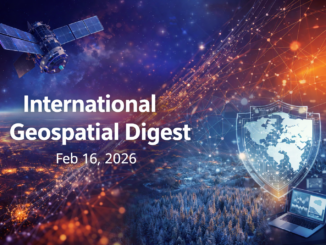If you want to learn about your customers, you gotta leave the office.. regularly. It’s no different for government who are increasingly told to find better ways to engage their constituents. In the geomatics business realm it’s natural to want to spend time with customers pouring over maps or “white boarding” the latest ideas, it’s crucial to finding common ground. However, being inundated with digital communications tempts us to ignore the value of face-to-face time and other more optimal ways to work together on particulars. When innovation is sought after, for example in the government open data initiatives, it becomes even more important to have effective connection with people in the trenches.
I propose the use of collaborative meeting spaces, a sort of Demilitarized Zone for government and constituents to connect – physical places where they can meet together, and not just so they can meet face-to-face, but to implement an innovative (new?) way of making spontaneous collaboration happen…
 In the geospatial marketplace, we often use the word open (data/source/gov/standards) to describe the kinds of interactions we want to see. However, I think we need to also consider what is common to all of us. As communities, we don’t particularly share much in “openness” aside from some green spaces and the ability to attend government meetings. But what we do share, in common, is quite vast and complex, touching many many aspects of our lives. For example, we all live in certain regions and share, in common, the governments that work for us and who collect local geodata.
In the geospatial marketplace, we often use the word open (data/source/gov/standards) to describe the kinds of interactions we want to see. However, I think we need to also consider what is common to all of us. As communities, we don’t particularly share much in “openness” aside from some green spaces and the ability to attend government meetings. But what we do share, in common, is quite vast and complex, touching many many aspects of our lives. For example, we all live in certain regions and share, in common, the governments that work for us and who collect local geodata.
The concept underlying the co-working model is worth applying here – but modify it to focus on getting government and constituents in the same rooms together. Okay, before you start pointing to the latest “open data” or “open government” conference event, that is not what I am talking about. That’s fine for some types of brainstorming but is often more like a one-way conversation. Dare I say it? We need relationships. We need relationships especially at the local level. Earth shattering and shocking, I know.
Why is “local” important? It builds accountability between all the people groups involved. Any quack can come off the street and share an opinion on twitter or at a conference event and afterward have no accountability for the ideas shared. Folks travel hundreds of kilometres just to join “local” protests or events in a region that is quite removed from their own backyard. Yet, in a way, they have as much influence as the locals that show up. The only way to help prevent this kind of noise is to keep it real – on the local level – with real (local) people – regularly.
You get the idea: local gov needs to know local constituents. After all, they likely know more about the real world context of much of the geodata that government manages on their behalf. Obviously, you don’t get to know somebody by simply inviting them to attend a meeting where you pitch your ideas and walk away. Special events aren’t bad, but since they get lots of air time already, I won’t waste your time ranting about them here. Just note they are not the only option.
What co-working concepts bring to the table is another type of engagement. We need to foster spontaneous innovation. It’s not always the first word I think of when I think about government, but there it is and here’s why.
[Co-working advocates already know where the rest of this article is going… so you can get back to work if you want.]
Unfortunately, planned events elicit some non-productive, anti-spontaneous responses from participants. Surely, fruitful engagement is possible, but it is even more possible that at least two typical attitudes work against solving problems in these venues. I suspect that these are at play in more ways than we can quantify. Namely, some people attend to merely observe – to collect information about where things might be headed; and others come with significant reservation – they may have ideas but hesitate to share them lest it’s ignored or not so progressive sounding as others who have the podium. I won’t suggest solutions to those situations here, because I believe a more profitable way to engage is readily available, so let’s focus on it.
Spontaneity helps facilitate interaction that may not occur through normal business processes, yet provides significant opportunities for cross pollination and collaboration. Once more, in English, for the rest of us… unplanned meetings can connect you with people who have solutions you need!
The co-working model appears to work well for business incubators and entrepreneurs looking to find other locals who share passion, skills or knowledge about similar problems. The recipe is: get people in a room together, keep it unscripted, learn about each others skills and carry on. This should also apply to local geodata users, web mapping application developers, and more. I guess you could put out a classified ad declaring: “Looking for other geeks or business folks who like programming.. to meet over coffee” – and I’d encourage that – but will anyone show up? I doubt your government colleagues will.
Instead, we need some type of co-working facilities that can make more “chance” occurrences happen between government employees and the public. I don’t necessarily want to sit and have coffee with the mayor though; that feels a bit too pretentious. But if, by chance, she was sitting in the same room talking with others about land use plans and looking at maps, I’d love to pitch into the conversation. Likewise, others may hear me talking about web development or field computing and realise we could work together. Win-win. How else is that possible to obtain? The Hackfest concept is similar as well, but remember, we’re looking for regular rubbing of shoulders on common, local, ground.
If public servants were encouraged to “pitch” their problems more casually, with a broader (yet local) audience, we could collectively have a lot of fun poking at common datasets to solve problems or even to test and develop potential solutions. This best occurs when constituents and government share the same workspaces at some level and get to know what others are up to. Obviously, there are times and places where this should not occur, but you get the idea.
How do we make those environments happen? What would happen if environments like this existed? We just don’t know, as we don’t have a lot of experience in this area. (Or at least I do not, so leave some juicy comments to catch me up!)
On a similar note, anytime that open data is discussed, the question of “what will be done with it” comes up. Well, we know with great precision that data on its own will do absolutely nothing! Now, if you put people into the equation, give them problems to solve, information resources at their fingertips and a place to talk with others about these… then you may just get some good old unexpected spontaneous networking and problem solving. That’s a far cry more productive that simply passing legislative policy. So while I applaud efforts being discussed, like in this article regarding Tony Clement’s comments, we need concrete action that goes beyond just making data available. And government can’t just do this on their own, we collectively need to find some space, throw in a coffee table and get mingling.
Without those kinds of coffee table discussions being possible, I am not so optimistic that ivory towers can truly connect with local solutions for local problems. Nor do I see how us constituents can really leverage the value inherent in our public data assets (open or not) without being able to have more casual conversations with custodians. You can start to see how it is not a problem that can be simply solved by throwing some cash at it, but requires depth of interaction leading to mutual understanding and trust, over time.
Co-working spaces could be a natural melting pot for innovative open ideas, I’ll leave it to you to figure out how to make those happen.




Be the first to comment